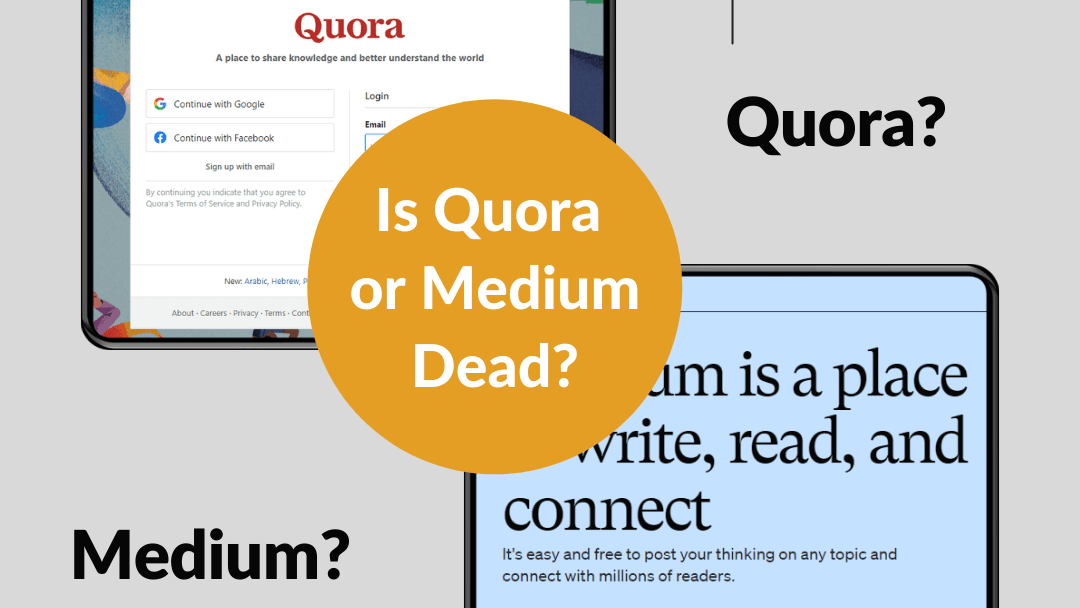When comparing the relevance of Quora and Medium, some may feel the two are too different for such a comparison. You can find answers to questions on both sites, but Quora does an excellent job drilling down the specifics with answers from qualified experts. That’s not to say Medium doesn’t have experts—they’re there and ready to share knowledge.
We aren’t comparing Quora or Medium here, however. Instead, we’re looking at both sites to determine if they’re valuable for marketing. Before doing that, let’s look at definitions for these sites.
- Quora: Founded in 2009, Quora is a question and answer-based website where users search for and obtain information.
- Medium: Launched in 2012, Medium is an open platform for writers to share and readers to obtain information.
In short, they’re both knowledge-based sites where users pose or answer questions about specific topics—however; they go about it a bit differently. For example, Medium is for blog-style content, while Quora features questions with threaded answers.
Medium and SEO Limitations
There is a lot that writers can do on Medium beyond sharing information—including generating leads, uploading custom images, and more. However, the underlying question here is—is Medium good for SEO? It’s a loaded question because some say yes, and others respond with a resounding no. Let’s break down the good and the bad:
Medium is good for SEO because:
- Users can research and incorporate high-performing keywords in titles, subheadings, and within the content
- Some Medium writers see increases in their blog’s traffic when reposting or backlinking
- Some believe the site’s authority is a big win for SEO
- Some users report positive SEO results because Medium follows canonical rules
Medium isn’t good for SEO because:
- Users cannot use an advanced analytics tool
- Links have little to no value because they’re “nofollow.”
- Some users report having SEO issues when reposting (Google flags posts without canonical links as duplicate content)
- Immediately reposting prevents Google from seeing your site as the post’s source (Best practice: Wait between one and two weeks to repost with a canonical link)
The Marketer’s Guide To Medium
Here are a couple of tips for marketing using Medium, including posting frequency and getting noticed.
How Often Should You Publish on Medium?
Even though this isn’t an SEO topic, per se, the more often you publish, the better exposure that brings. If you don’t have enough time to publish on Medium daily, the sweet spot seems to be posting between three and five times weekly.
How Do You Get Noticed on Medium?
There are several ways of getting noticed on Medium, including the following:
- Post valuable information regularly
- Cross-link to other internal (Medium writers) and external (reputable resources) contextually
- Interact with your readers socially in comments, on their posts, and in their online communities
- Write for Medium publications outside of yours
- Incorporate many images (Canva.com is an excellent tool for creating unique image content)
Is Quora marketing Relevant in 2021?
Marketing using Quora is just as relevant now as it’s ever been. Because of the site’s changes—stricter policies against promotional links, more competition, new content types, and more—some marketers find it challenging to use Quora. However, for some businesses, the site proves quite valuable.
How to Use Quora for Marketing
There isn’t a magic formula for using Quora for marketing. Here are some basic steps:
- Set up a profile, ensuring it includes your interests and qualifications
- Follow Quora topics relevant to those interests and topics
- Ask and answer questions about what you list in your profile
- Connect with other users active in your niche
- Build authority, so you can eventually mention your company’s products or services in answers
Why Quora Matters for Your Marketing Strategy
Quora is an excellent tool for determining your target audience’s pain points. What problems do they need to solve? They might post questions on Quora while searching for solutions. Use that content as inspiration for creating relevant content on your site.
Why Quora Makes Sense for Content Distribution
With over 300 million monthly unique visitors looking for tips, evaluating products, conducting research, and learning about specific topics, Quora is a gold mine for exchanging knowledge and reaching target audiences. Quora sets the stage for askers, information seekers, readers, and writers to find and post evergreen content.
Because Quora personalizes content according to what users want to learn, its content is always relevant. Because it’s evergreen, content doesn’t get lost in the shuffle or pushed down to the bottom of a distribution list. It’s always easy to find, no matter when users search.
Quora or Medium: The Choice is Yours
No matter which direction you choose to go in, Quora or Medium are excellent tools for finding and marketing content to your target audience. A good strategy is using both tools to ensure you reach and engage with more target audience members.
FAQ
How Can Marketers Use Quora for SEO?
- Conduct keyword research on the topics your target audience searches for or asks about the most.
- Complete a content gap analysis using Quora
- Target content and define the best answers for that information
- Use Quora as part of your link-building strategy
Why Choose Medium as a Marketing Platform?
Marketers love using Medium as a marketing platform because it allows them to reach a larger audience and amplify their content. Best practices for using Medium as a marketing platform include:
- Incorporating high-value CTAs
- Create and build up a publication
- Use formatting to catch the reader’s attention
- Backlink content on other sites
